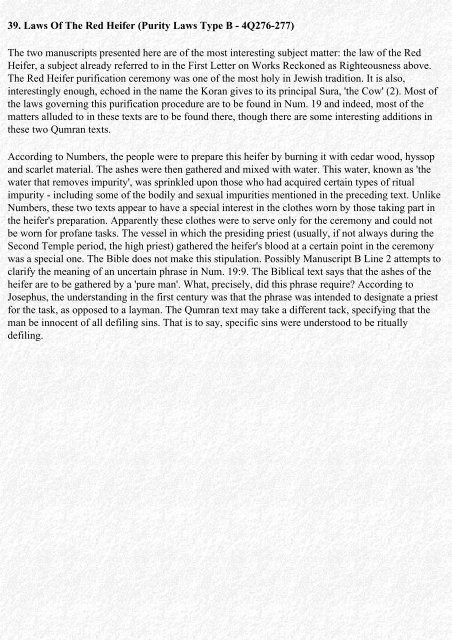Dead Sea Scrolls Uncovered - The Preterist Archive
Dead Sea Scrolls Uncovered - The Preterist Archive
Dead Sea Scrolls Uncovered - The Preterist Archive
Create successful ePaper yourself
Turn your PDF publications into a flip-book with our unique Google optimized e-Paper software.
39. Laws Of <strong>The</strong> Red Heifer (Purity Laws Type B - 4Q276-277)<br />
<strong>The</strong> two manuscripts presented here are of the most interesting subject matter: the law of the Red<br />
Heifer, a subject already referred to in the First Letter on Works Reckoned as Righteousness above.<br />
<strong>The</strong> Red Heifer purification ceremony was one of the most holy in Jewish tradition. It is also,<br />
interestingly enough, echoed in the name the Koran gives to its principal Sura, 'the Cow' (2). Most of<br />
the laws governing this purification procedure are to be found in Num. 19 and indeed, most of the<br />
matters alluded to in these texts are to be found there, though there are some interesting additions in<br />
these two Qumran texts.<br />
According to Numbers, the people were to prepare this heifer by burning it with cedar wood, hyssop<br />
and scarlet material. <strong>The</strong> ashes were then gathered and mixed with water. This water, known as 'the<br />
water that removes impurity', was sprinkled upon those who had acquired certain types of ritual<br />
impurity - including some of the bodily and sexual impurities mentioned in the preceding text. Unlike<br />
Numbers, these two texts appear to have a special interest in the clothes worn by those taking part in<br />
the heifer's preparation. Apparently these clothes were to serve only for the ceremony and could not<br />
be worn for profane tasks. <strong>The</strong> vessel in which the presiding priest (usually, if not always during the<br />
Second Temple period, the high priest) gathered the heifer's blood at a certain point in the ceremony<br />
was a special one. <strong>The</strong> Bible does not make this stipulation. Possibly Manuscript B Line 2 attempts to<br />
clarify the meaning of an uncertain phrase in Num. 19:9. <strong>The</strong> Biblical text says that the ashes of the<br />
heifer are to be gathered by a 'pure man'. What, precisely, did this phrase require? According to<br />
Josephus, the understanding in the first century was that the phrase was intended to designate a priest<br />
for the task, as opposed to a layman. <strong>The</strong> Qumran text may take a different tack, specifying that the<br />
man be innocent of all defiling sins. That is to say, specific sins were understood to be ritually<br />
defiling.
















